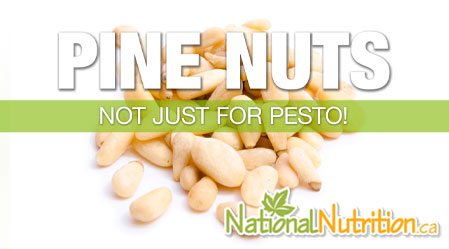
PINE NUTS ARE A RICH SOURCE OF VITAMINS, MINERALS, HEALTHY FATS AND ANTIOXIDANTS
Pine Nuts
Updated Mar. 04th, 2022
Most people think of pesto when they hear about pine nuts. However, when looking at the nutritional value of pine nuts we see that for those who are not allergic to them they offer a rich source of nutrients and culinary versatility to be added to salads, nut butters, shakes and your favorite yogurt.
What are Pine Nuts?
Pine nuts, also called Cedar nuts, are from two specific species of pine trees – Pinus sibirica and Pinus koraiensis. Pine nuts have a tough outer shell and their edible soft kernel has a creamy white buttery delicate flavour.
Pine nuts, like other nuts, are a rich source of vitamins, minerals, antioxidants, and healthy fats.
What are Pine Nuts used for?
Pine nuts provide a rich source of energy (673 cal/100g) of healthy protein, fats, antioxidants, minerals, vitamins and other phytonutrients.
Pine nuts are abundant in the monounsaturated fatty acid called Oleic Acid. Oleic Acid helps reduce “bad” LDL Lipoprotein cholesterol from your blood and at the same time increases “good” HDL Lipoprotein cholesterol. This positively affects your blood lipid profile, overall cholesterol, and minimizes the degree of cardiovascular disease that can develop over time.
Another essential fatty acid that Pine nuts contain is Pinolenic acid. This special fatty acid has been shown in studies to facilitate weight loss. It does this by releasing hunger suppressing enzymes called Cholecystokinins and Glucagon-like peptides-1 (GLP-1) in your gut and this reduces appetite. Pinolenic acid has also been shown to increase LDL Cholesterol uptake by the liver which can reduce your blood LDL levels. This has been shown to be important for cardiovascular health.
Also protective for your cardiovascular system, pine nuts are high in Vitamin E. In fact just 100g of pine nuts have 9.33mg of Vitamin E, which is 63% of your RDA. Vitamin E is a powerful lipid-soluble antioxidant which protects your cell membranes, mucus membranes and skin from oxidative cellular damage.
Another mineral which is high in pine nuts is Manganese. Manganese is important for many things in your body particularly making Superoxide Dismutase (SOD). SOD is a critical antioxidant which protects your cells from becoming damaged.
Pine nuts are rich in minerals, including Calcium, Magnesium, Iron, Potassium, Selenium, and Zinc. Minerals are important for structural tissues in your body, like your bones, nails, teeth, tendons, ligaments and muscles. They are also key co-factors for almost all enzyme systems in your body.
Pine nuts are an excellent source of B Vitamins like Riboflavin, Niacin, Thiamine, Pantothenic Acid, B6 and Folate. B Vitamins work together for nerve transmission, hormone health and as co-factors in energy metabolism in your body.
How do you use Pine Nuts?
Pine nuts are a great snacking nut. A quick handful along with a piece of fruit makes for a perfect combination of carbohydrate and fat, which will satisfy your hunger and provide antioxidants, vitamins and minerals.
Gently toasted with a bit of coconut oil, cinnamon and nutmeg or a spicy cumin curry mix makes for a yummy treat to be eaten solo or sprinkled on a green salad
If no time for toasting, simply add raw pine nuts to salads or a cooked whole grain like brown rice or quinoa.
Some use pine nuts in deserts, on yogurt or on hot cereals. Or make a traditional Basil or Cilantro Pesto. Yum!
Alternately, grind them up with Walnuts and Pecans to make a wonderful natural nut butter for flat breads.
What kind should I get?
Any nut or seed is best bought raw. All nuts and seeds have fragile oils which can go rancid and turn into unhealthy trans fats when stored for a long time, or when exposed to air or heated. So purchasing them raw is one way to get fresh healthy nuts. Another way is to store them in the fridge. If you can find pine nuts in an air tight package it's even better.
Alternatives
Pine nuts are tree nuts and as such they can be allergenic to some people. If you know or suspect you may have a tree nut allergy you will want to avoid Pecans.
If you are unsure, food allergy and sensitivity testing can be done through your ND or MD.
Alternatives to pine nuts are seeds like pumpkin, sesame, chia, and sunflower. Raw seeds can also provide healthy fats, minerals and antioxidants to benefit your health.





















